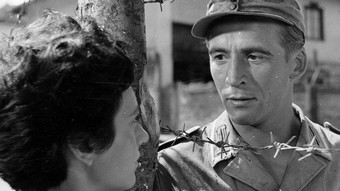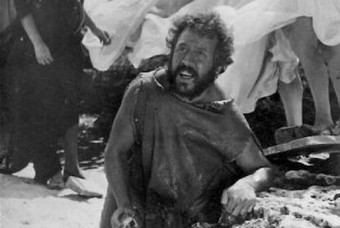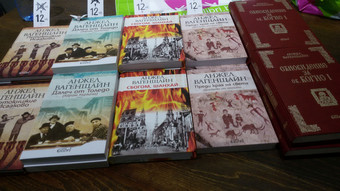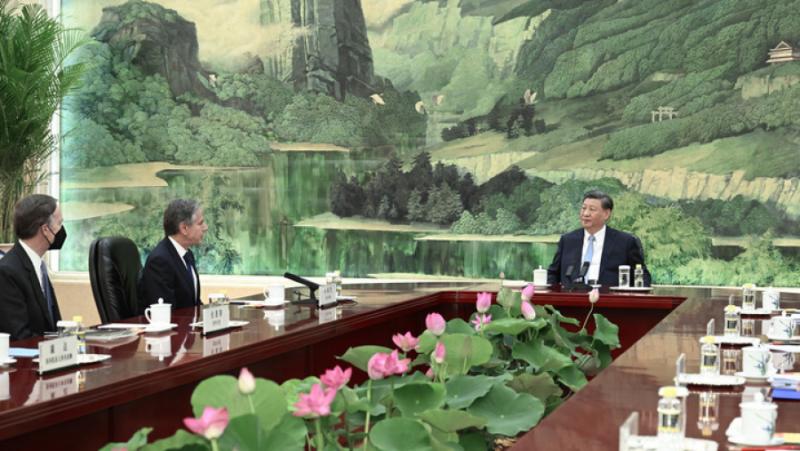/ world today news/ The premiere of an American documentary film about the life of Angel Wagenstein took place at the House of Cinema
Angel Wagenstein: one life, 3 revolutions, 52 films, 4 novels, 1000 pages of “doodles”. The American documentary “Art is a Weapon” (Art is a Weapon) begins with this interlude, dedicated to the great Bulgarian writer, screenwriter, public figure and intellectual Angel Wagenstein. The premiere of the film, the work of director Andreya Simon and the famous New York film studio “Arcadia”, was already a great success in the USA, and on May 2 it was shown for the first time to a Bulgarian audience at the House of Cinema in the capital. The official premiere of the film will mark the 95th anniversary of Angel Wagenstein and will take place on his anniversary – on October 17, 2017 at the Lumiere cinema. And before that, the premieres of the film are coming up in Berlin and Moscow.
The stormy, eventful life of Wagenstein, whom everyone calls simply Jackie, ranks among the most significant untold stories of world cinema. A World War II Resistance fighter with a death sentence, a prominent film screenwriter, director, writer, parliamentarian and rebel throughout his conscious life. Today, at the age of 94, Angel Wagenstein commands respect for his sharp mind and critical thinking, and his charisma and elegant sense of humor remain intact.
An emotional, painfully honest and provocative portrait that skilfully combines personal conversations with fragments of Jackie’s brilliant films and rare archival footage from his seven decades of existence in the field of culture and politics in Bulgaria. However, everyone who sees this film inevitably asks the question: Why did an American woman and a famous American film company have to make a film about Jackie, so that we hear today in Bulgaria about fascism, about the years of socialism, about the place of culture in social development. ..
The films shot according to the scripts of Angel Wagenstein tell the events of different eras, but whether we see Aesop or Boris on the screen, the deportation of the Jews from Macedonia and Greece, the feat of the Septemvrians or the tortures of Goya, they are always subordinated to one idea – the idea for the free man, for the relationship of the creator with power and for that great and bright celebration of socialism, in which capital, poverty and war give way to justice, the will of the working man, to the triumph of brotherhood and solidarity. In his name, the most literate children of Bulgaria die, in his name the implacable struggle continues, the price of which people like Jackie often pay dearly: We can live otherwise! Naivety or appeal?
Angel Wagenstein, in both cinema and literature, doesn’t just tell stories, he states positions. Therefore – “Art is a weapon”!
Through three turning epochs
Julia Petkova
Varna
Angel Wagenstein: “Every revolution is an adventure with an unclear outcome – too often different from the messages at its beginning, because revolutions are born to change the surrounding landscape and die.”
Andrei Simon’s penetrating biographical film “ART IS A WEAPON” is inspired by the extraordinary fate of a man with a multifaceted gift, uncompromisingly consistent in his views, author of works that will remain in the treasury of Bulgarian art. The film opens with footage of the dismantling of the infamous quintet of the former Party House in Sofia, shows key moments of rallies and public appearances by Jackie, who is in the vanguard of the democratic wave after 1989, but soon after is disgusted by the pseudo-democratic posturing and cynicism of the “new” political conjuncture. I have lived through three political systems. At least three times in my life I have started from scratch, admits the artist.
Together with Jackie, you will walk through his memories of his native Plovdiv, his father, who was a staunch communist, and his own partisan activities. You will review significant films of his career and the reasons why some of them were banned in our country. You will learn more about his motives for taking one or another civic and political position and defending it without hesitation, with reason and sense. His humanism is anything but abstract, although he has received such a charge.
Wagenstein argues that he does not separate writing per se from writing for cinema. Moreover, he believes that the “ink of life” permeates all his works. His films expose societal ills and pose questions such as: When is an artist doomed to be a servant of power? What is the price paid by the autonomous creator? What kind of power is power imposed by force?
The documentary film by the American director Andreya Simon from the New York studio “Arcadia” highlights a phenomenon that is detrimental to the Bulgarian reality: our inability to objectively assess the recent past. Our tendency to denigrate everything that has been, including the obvious achievements, and to extol as just and only possible the present socio-political order. And this creates a feeling that nothing has changed. The film manages the seemingly impossible. To draw in an hour and a half a portrait of a complex person whose biography spans three pivotal historical eras. The film also stars the famous British writer of Indian origin Rana Dasgupta, known in our country for his novel “Solo”.
Angel Wagenstein is an active anti-fascist who went through the hell of the Geshev Inquisitions, was sentenced to death, but survived by chance because the Soviet Army proved to be faster than the Bulgarian judicial bureaucracy. After the war, he studied cinematography at the Moscow Film Academy (VGIK) and received a diploma as the first foreigner to attend and graduate from the academy. Wagenstein is an award-winning screenwriter, the author of 52 films, enjoying enormous authority from Shanghai to Moscow, Berlin, Rome, Paris and Madrid to New York.
He is a skilful story-teller, a pamphleteer with a restrained but powerful pen, a citizen of the world, and a rebel against every dictate and every form of falsehood. His life is full of absurdities, but it is clear from the film that he does not like to be called a “dissident”. During the communist regime, he was branded as the “disreputable Jew” and twice expelled from the party. The State Security authorities were actively interested in him, not because of “treason”, but because of the activities with which he remains true to his ideas and his vision of a fairer and wiser world.
Angel Wagenstein is a writer whose books, paradoxically (and symptomatically), are better known around the world than in his homeland. Let us mention only the brilliant triptych “Isaac’s Pentateuch”, “Far from Toledo” and “Farewell, Shanghai”, dedicated to the fate of European Jews during the Second World War. Apart from Bulgaria, these novels were published in Germany, France, Russia, USA, Israel, Spain, Poland, Italy, Czech Republic, China and Macedonia. His novels have received numerous international awards – European Prize for Literature “Jean Monet”, Annual Award of the Sorbonne, of the Union of French Booksellers, the Italian “Adei-Wizo”. Jackie is also a recipient of the European Prize for Literature, the German National Award with the Golden Order of Goethe, an Officer of the French Order of Arts and Letters, and the Russian Pushkin Medal. His Bulgarian awards are “Paisiy Hilendarski”, “Stara planina” order – 1st class, etc.
Thank you
I am impressed by the talent and scale of the original and ingenious thinking and creativity of this living man – legend Angel Wagenstein, 94 years old, created 52 films, experienced 3 revolutions. I was inspired by the scope of his directorial talent and the wisdom of the messages of the man who lived and created with ideals, who suffered disappointments, who today presented us with an incredibly beautiful bouquet of his life story with freshness and analysis that only he is capable of. Thank you. We will remember.
Tatyana Zheleva
Burgas, 3.05.2017
Andrea Simon

The film “Stars” (1959), directed by the famous German artist Konrad Wolff, won the Special Jury Prize at the Cannes Film Festival, but in our country it is… banned

Famous Russian actor Donatas Banionis played the role of Goya in Wagenstein’s film of the same name

Georgi Kaloyanchev in the role of Aesop in Jackie’s film of the same name

Jackie is fluent in German, Russian, French…
#Art #weapon #View #Info

